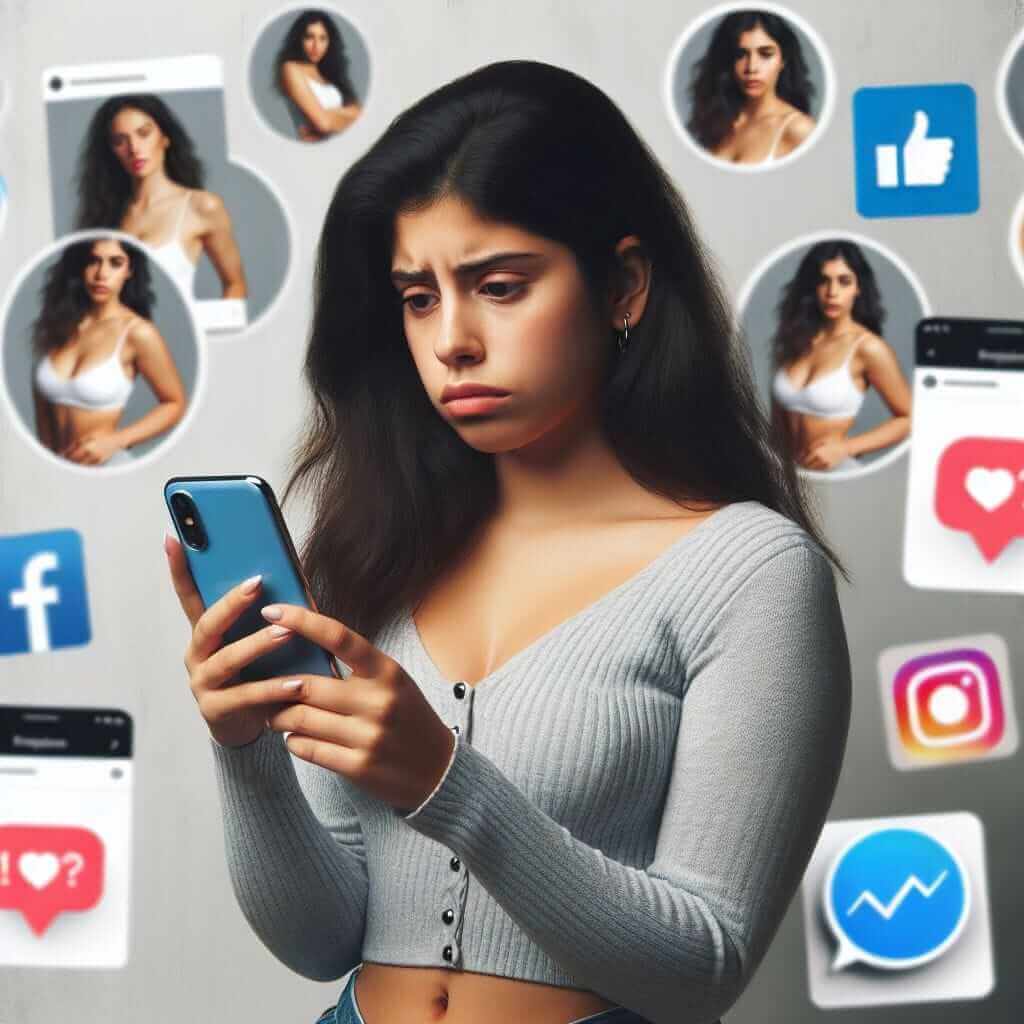The pervasive influence of social media on body image is an increasingly prevalent topic in IELTS Writing Task 2. This essay will delve into the multifaceted effects of social media on how individuals perceive their bodies, providing a comprehensive guide to crafting a high-scoring IELTS essay on this subject.
We’ll analyze common question types, dissect a sample question, offer a band 8 model essay, and highlight key vocabulary and grammar points. Let’s get started!
Common IELTS Essay Questions on Social Media and Body Image
Here are some examples of how this topic might appear in the IELTS Writing Task 2:
- To what extent do you agree or disagree that social media has a negative impact on people’s body image? (Opinion Essay)
- Social media is often blamed for the pressure to conform to unrealistic beauty standards. Discuss the causes of this problem and suggest some possible solutions. (Causes and Solutions Essay)
- Many young people feel pressure to look perfect because of the images they see on social media. What are the effects of this trend and how can young people be encouraged to have a healthy body image? (Effects and Solutions Essay)
Sample Essay Analysis
Let’s choose one of these questions to analyze in detail:
“Social media is often blamed for the pressure to conform to unrealistic beauty standards. Discuss the causes of this problem and suggest some possible solutions.”
Analysis
- Type: Causes and Solutions Essay
- Keywords: social media, pressure, unrealistic beauty standards, causes, solutions
This question requires a balanced discussion of the reasons behind the pressure to conform to unrealistic beauty standards perpetuated by social media and presents viable solutions to address this issue.
Model Essay
Social media has become increasingly intertwined with our lives, and its influence on societal beauty standards is undeniable. This essay will argue that the curated perfection often depicted online fuels unrealistic expectations, leading to body image concerns. It will further propose solutions to combat this issue.
One primary cause of this pressure stems from the carefully constructed images and content prevalent on platforms like Instagram and TikTok. Influencers and celebrities often present idealized versions of themselves, employing filters, editing tools, and professional photography to achieve a flawless appearance. Constant exposure to such unattainable standards can distort perceptions of beauty, making individuals feel inadequate about their own bodies. Furthermore, algorithms often prioritize content that promotes these unrealistic ideals, creating echo chambers where users are bombarded with similar images, further reinforcing the pressure to conform.

Addressing this complex issue requires a multi-pronged approach. Social media platforms should be held accountable for promoting diverse and realistic representations of beauty. This can be achieved by encouraging body positivity campaigns and partnering with mental health organizations to provide resources and support. Additionally, media literacy initiatives can empower users to critically evaluate the content they consume and recognize the manipulation often involved in creating online personas. Parents, educators, and role models also play a crucial role in fostering healthy body image among young people by emphasizing inner qualities over physical appearance and encouraging open discussions about self-esteem and self-acceptance.
In conclusion, while social media can contribute to body image pressures by perpetuating unattainable beauty standards, a collective effort involving platforms, users, and society as a whole is essential to mitigate its negative impacts and promote a more healthy and inclusive online environment. (Word count: 289)
Writing Tips
- Vocabulary: Use specific and sophisticated vocabulary related to the topic, such as “curated perfection,” “idealized versions,” “unattainable standards,” “distorted perceptions,” “media literacy,” and “body positivity.”
- Grammar: Employ a range of grammatical structures, including complex sentences, relative clauses, and passive voice, to showcase your language proficiency.
- Organization: Structure your essay logically, with clear topic sentences and supporting evidence for each point. Use cohesive devices to ensure a smooth flow of ideas.
- Relevance: Stay focused on the essay question and avoid going off-topic.
- Examples: Provide relevant examples to support your arguments, such as mentioning specific social media platforms or campaigns.
Useful Vocabulary
- Perpetuate (verb): /pərˈpɛtʃueɪt/ – to make something continue for a long time
- Unattainable (adjective): /ˌʌnəˈteɪnəbl/ – impossible to achieve
- Distorted (adjective): /dɪˈstɔːrtɪd/ – twisted out of shape, altered from the truth
- Algorithm (noun): /ˈælɡərɪðəm/ – a set of rules used by a computer to solve problems
- Echo chamber (noun): /ˈɛkoʊ ˌtʃeɪmbər/ – a situation in which people only hear opinions that are the same as their own
- Body positivity (noun): /ˈbɒdi ˌpɒzɪˈtɪvɪti/ – acceptance and appreciation of all body types
Conclusion
Navigating the impact of social media on body image is crucial for IELTS Writing Task 2 success. By understanding the nuances of the topic, crafting well-structured essays with strong vocabulary, and practicing regularly, you can confidently tackle any question related to this theme. Remember to explore related issues, such as the effects of social media on self-esteem or youth development, to expand your understanding and writing repertoire. For more resources, you can check out this insightful article on the effects of social media on self-esteem.